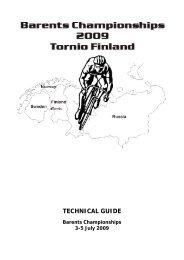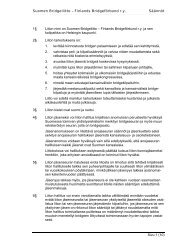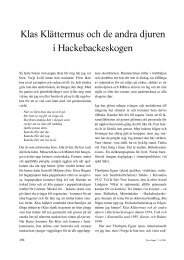Struggles for Sustainable Urban Development in Cochabamba, Bolivia
Struggles for Sustainable Urban Development in Cochabamba, Bolivia
Struggles for Sustainable Urban Development in Cochabamba, Bolivia
You also want an ePaper? Increase the reach of your titles
YUMPU automatically turns print PDFs into web optimized ePapers that Google loves.
numerous examples of efficient publicly owned water utilities <strong>in</strong> develop<strong>in</strong>g countries such as<br />
Ecuador, Chile, Zimbabwe and Botswana (Johnstone et al. 1999). The successful examples<br />
have a certa<strong>in</strong> degree of autonomy and <strong>in</strong>centives <strong>for</strong> the staff. Nickson & Vargas (2002) tell<br />
of another such example, a publicly owned water utility praised by the World Bank <strong>in</strong> Santa<br />
Cruz de la Sierra. Although <strong>in</strong>ternational f<strong>in</strong>ance <strong>in</strong>stitutions have started to promote private<br />
sector participation with<strong>in</strong> the structural adjustment framework, the public water utility <strong>in</strong><br />
Santa Cruz de la Sierra was still granted a loan <strong>for</strong> network improvement by the World Bank.<br />
However the <strong>Bolivia</strong>n government refused to guarantee the loan, demand<strong>in</strong>g that <strong>in</strong>vestment<br />
<strong>in</strong>to urban water supply should be carried out by private sector only. This reflects how<br />
narrow m<strong>in</strong>ded the central government has become with its neo-liberal agenda, conducted<br />
s<strong>in</strong>ce 1985. Paul Hirst (1997) believed that:<br />
The danger of recklessly pursued <strong>in</strong>ternationalization without sufficient regard to<br />
its social effects is that there will be revolts aga<strong>in</strong>st an open <strong>in</strong>ternational<br />
economy <strong>in</strong> both the advanced and the developed world.<br />
If the <strong>Bolivia</strong>n government had considered this, perhaps the bloodshed over water would<br />
have been avoided. On the other hand it might be unjustified to popularly blame neo-liberal<br />
strategies. Perhaps it was not neo-liberalism itself that caused the problems, but the way it<br />
was implemented without adequate social considerations. Privatisation has come to be<br />
considered by the majority of <strong>Bolivia</strong>ns as <strong>in</strong>tr<strong>in</strong>sically bad, although it might, when carefully<br />
implemented, prove a useful development tool.<br />
In l<strong>in</strong>e with neo-liberal economic strategy Chanda (2003) argues that:<br />
Trade liberalization <strong>in</strong> services can result <strong>in</strong> <strong>in</strong>creased competition, lower prices,<br />
more <strong>in</strong>novation, technology transfer, employment creation, and greater<br />
transparency and predictability <strong>in</strong> trade and <strong>in</strong>vestment flows’.<br />
Actually service efficiency improved under Aguas del Tunari (see Nickson & Vargas 2002).<br />
Besides the efficiency, however, the equity and government legitimacy ga<strong>in</strong>s were far below<br />
expected. Economic literature often ignores social or political aspects of privatisation which<br />
14

















